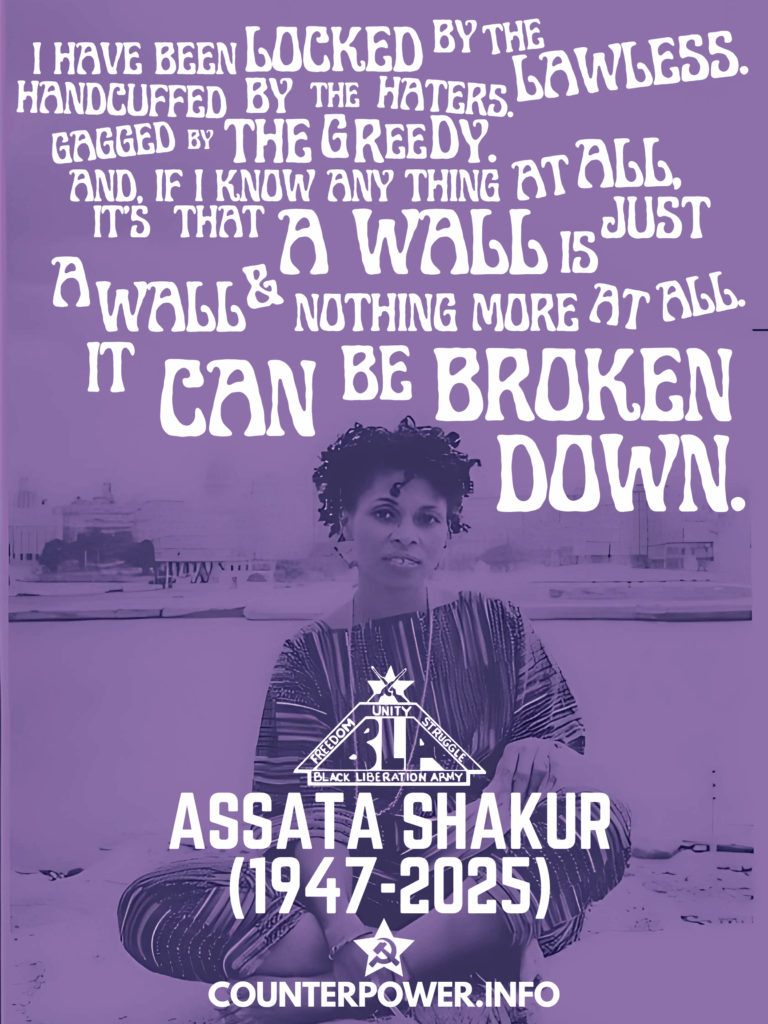
We join with millions of people around the world to mourn the loss of a heroic revolutionary, comrade Assata Shakur. Like so many, we owe an immense debt to her life of struggle in the service of Black liberation and socialism. Her inspiring life story, as told in Assata: An Autobiography (1987), has changed the lives of countless people. While the imperialist United States attempted to capture and imprison her—even offering a $1,000,000 reward—none of this was enough to stop Assata.
In 1968, she joined the Black Panther Party (BPP), leading its Harlem chapter while overseeing their Free Breakfast for Children program. In the 1970s, she joined the Black Liberation Army (BLA), a communist politico-military organization of New Afrikan Freedom Fighters committed to the struggle for the self-determination of the Black nation. Inspired by the freedom fighters of Algeria and China, Cuba and Vietnam, the BLA aimed to organize a partisan resistance movement against U.S. imperialism.
Assata was a Panther, New Afrikan Freedom Fighter, and citizen of the Provisional Government of the Republic of New Afrika (RNA-PG). “To me,” she explained in her autobiography, “the revolutionary struggle of Black people had to be against racism, capitalism, imperialism, and sexism and for real freedom under a socialist government.”1
Assata was targeted and hunted by the FBI’s Counterintelligence Program, or COINTELPRO, especially for her work with the BLA. In her autobiography, she wrote:
One day, in the not too distant future, any Black organization that is not based on bootlicking and tomming will be forced underground. And as fast as this country is moving to the fascist far right, Black revolutionary organizations should start preparing for the inevitability. Fascist governments do not permit revolutionary or progressive opposition groups to exist, no matter how peaceful or nonviolent they are.2
In May 1973, Assata was wounded in a shootout on the New Jersey Turnpike, resulting in her capture and subsequent torture by the state. In 1979, she was liberated from prison by a group of comrades led by Mutulu Shakur and Marilyn Buck, later resurfacing in socialist Cuba, where she would live the rest of her life. For Cuban communists, the Black Liberation Movement represented one front in a global movement for decolonization, national liberation, and socialism. “Nobody in the world, nobody in history,” Assata wrote, “has ever gotten their freedom by appealing to the moral sense of the people who were oppressing them.”3 Assata believed that the exploited and oppressed masses have the right to self-determination and the capacity to govern their own affairs, and emphasized that we have nothing to lose but our chains and a world to win.
Reactionaries will attempt to slander her name. But to the freedom fighters of the world, her life is an example to be cherished and celebrated, studied and emulated. Escaping the clutches of U.S. imperialism, Assata is nothing less than a hero to the exploited and oppressed masses of the world. While we mourn the loss of a courageous freedom fighter, we salute her service to the people. Her name, Assata, means “she who struggles,” and she taught us what it means to live for the people’s struggle.
Now famous, her words have become sacred to all who yearn for liberation:
It is our duty to fight for our freedom.
It is our duty to win.
We must love each other and support each other.
We have nothing to lose but our chains…
We must fight on.4
Long Live Comrade Assata Shakur!
Self-Determination for the Black Nation!
Victory to the World Socialist Revolution!
1 Assata Shakur, Assata: An Autobiography (Chicago: Lawrence Hill Books, 2001), 197.
2 Assata, Assata: An Autobiography, 227.
3 Assata, Assata: An Autobiography, 139.
4 Assata, Assata: An Autobiography, 52–53.
